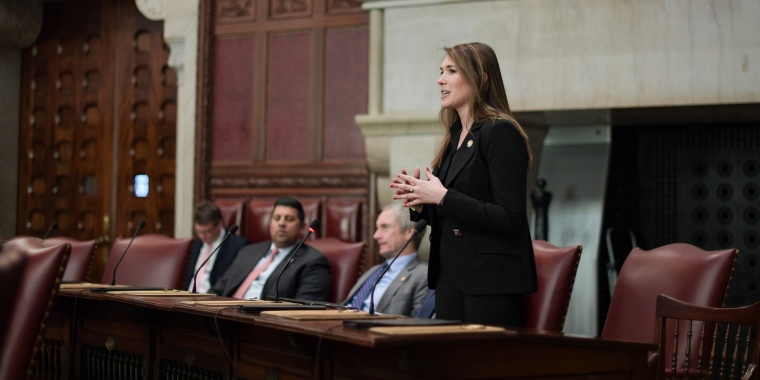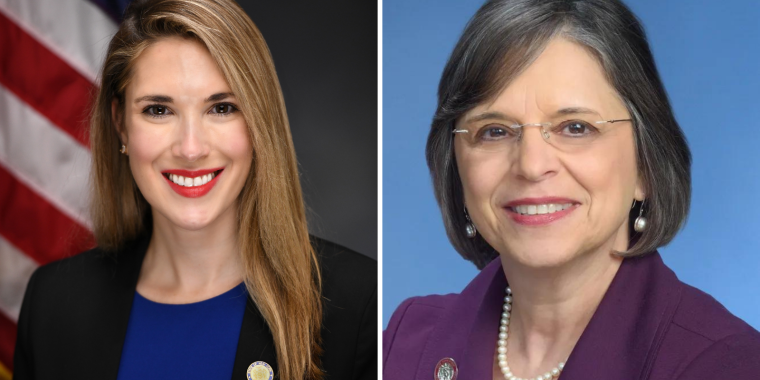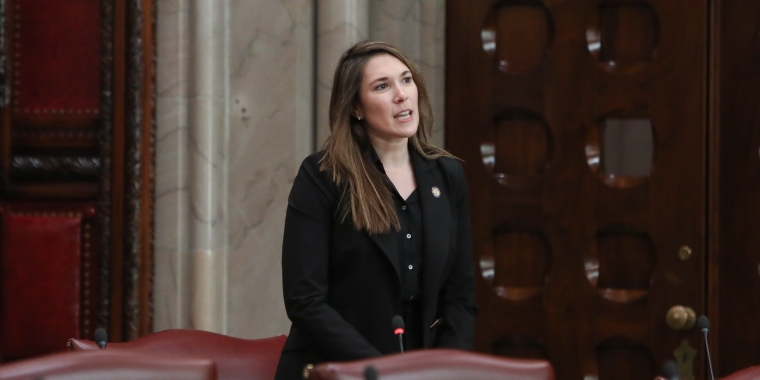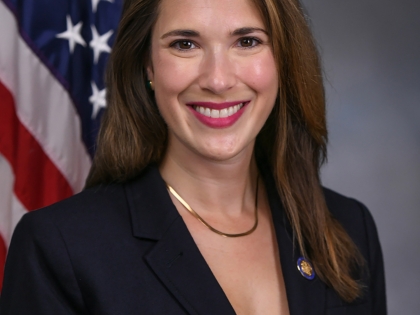
Hinchey, Fahy Deliver First-of-its-Kind Short-Term Rental Law for New York
December 23, 2024
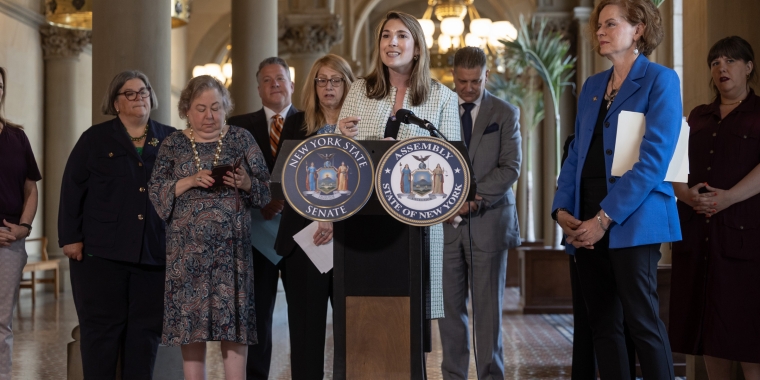
Albany, NY (Dec. 23) – New York has taken a historic step in addressing housing challenges and short-term rental transparency with the signing of its first statewide Short-Term Rental Registry into law. Sponsored by Senator Michelle Hinchey and Assemblymember Patricia Fahy, the legislation (S.885C / A.4130C) signed on Saturday is the first-of-its-kind nationwide and a turning point in holding billion-dollar booking platforms, like Airbnb and Vrbo, accountable to the communities where they conduct business. The law offers a new county-by-county look into the explosive growth of the short-term rental industry and is aimed at helping communities across the state manage housing availability and affordability while bringing in owed revenue from sales taxes and hotel and motel occupancy taxes.
Short-term rentals (STRs) are essential to New York’s tourism economy but have also intensified housing challenges by increasing rents, inflating home prices, and depleting available housing stock. Under the new law, booking platforms will report quarterly to the New York State Department of State (DOS) on the number of bookings it facilitates in each county. Counties that choose to create local registries will receive detailed quarterly reports from booking platforms, including rental locations, occupancy nights, guest counts, and taxes collected. This will help ensure local governments have the information they need to effectively balance the needs of the housing market and the tourism economy. It will also give local leaders more resources to address their community’s most pressing needs: over the last five years, NY communities have lost up to $550 million in uncollected sales and occupancy tax revenue, according to All The Rooms.
“Our Short-Term Rental Registry is a breakthrough for New York’s housing future and a first-in-the-nation effort to hold billion-dollar booking platforms accountable in the communities they operate in. The Hudson Valley and communities across New York have been counting on us to get this bill across the finish line, and I’m incredibly proud to say that we’ve done it,” said Senator Michelle Hinchey. “For the first time, communities will have the tools to grasp the true scope of short-term rentals, empowering them to develop strategies to expand stable housing options, increase affordability, and unlock untapped revenue. Getting this done took serious teamwork with leaders from every level of local government, the tourism and hospitality industry, and housing advocates who worked with us to make sure this bill would strike the right balance between supporting a local economic driver and working toward a future where housing is more accessible and affordable in New York. I’m deeply proud to have led this effort alongside Assemblymember and Senator-Elect Patricia Fahy, and I’m grateful to Governor Hochul for signing our bill into law and championing short-term rental accountability as a key piece of our housing strategy.”
“New York’s groundbreaking Short-Term Registry Law sets a national standard for helping our communities collect real data to shed light on a market that has grown exponentially and helped fuel housing shortages, while leveling the playing field for hotels and motels, and boosting county tourism programs,” said Assemblymember and Senator-Elect Patricia Fahy (D—Albany). “Across New York State, communities will finally have the tools necessary to track and analyze how short-term rental units impact their local housing markets, allowing them to craft solutions that will land more New Yorkers in stable housing, drive up supply, and make housing stock more affordable. Small and independently owned hotels and motels will face a level playing field. Local governments will unlock new tourism revenue to help attract visitors, stabilize housing markets, and address the affordability crisis. I’m incredibly proud to have worked with Senator Hinchey and a broad coalition of advocates to establish a well-balanced and landmark framework for New York’s $1 billion short-term rental industry that will have national ramifications. I thank Governor Kathy Hochul for signing this legislation into law, and I look forward to seeing its implementation and impacts on local communities across New York.”
“This legislation will finally place short-term rentals on a level playing field alongside hotels and motels and generate local revenue from visitors that supports county tourism and essential services such as public safety, social services, and infrastructure improvements,” said New York State Association of Counties (NYSAC) President Benjamin Boylin II. “We commend Governor Hochul, Senator Hinchey, and Assemblymember Fahy for their leadership on this issue and for working with counties to reach a compromise that will keep the short-term rental industry strong while also providing local governments with the resources and data they need to address our state’s housing crisis and fund essential local services."
“The collaborative work between the Governor, the Senate, and the Assembly is a wonderful reminder of how the great state of New York can lead the way nationally on an issue like short-term rentals. We thank Governor Hochul, Senator Hinchey, and Assemblymember Fahy for their leadership on the Short-Term Rental Registry,” said New York State Hospitality & Tourism President Mark Dorr. “This first-of-its-kind statewide law is a commonsense approach that supports both fairness and transparency while leveling the playing field for the state’s lodging industry. Short-term rentals, a $1 billion-per-year industry, have operated without oversight for nearly a decade. With this new registration system, we’re not only ensuring communities benefit from fair sales and occupancy tax collection but also giving communities a powerful tool to understand and manage the housing and tourism landscape in their area. This legislation supports the lodging industry and recognizes the valuable role short-term rentals play in our tourism economy, allowing all to thrive side by side.”
Barbara Van Epps, Executive Director of the NYS Conference of Mayors (NYCOM), said, “NYCOM sincerely thanks Senator Hinchey and Assemblywoman Fahy for their leadership on this critically important issue. This new law will not only level the playing field by ensuring that short-term rentals are subject to the same taxes as other key players in the hospitality industry, but it will also provide our members with the data they need to understand the scope of short-term rentals in their cities and villages. Armed with this information, local leaders will be better equipped to address housing and other economic challenges in their communities.”
Christopher A. Koetzle, Executive Director of the Association of Towns, said, “We are pleased that the governor signed the state’s Short Term Rental legislation into law. NYAOT has worked hard in conjunction with bill sponsors and with the governor’s office to protect towns’ interests and this bill helps protect our communities and helps give our local government the tools they need to enforce local zoning and further protect their residential areas. The Association of Towns would like to thank Governor Hochul and the bill’s sponsors, Assemblywoman Fahy and Senator Hinchey, for their hard work on this bill and for maintaining localities’ autonomy in handling short-term rentals for their community.”
Lukee Forbes, Campaign Manager for the Hudson/Catskill Housing Coalition, said, “As someone who knows the struggles families face firsthand, I can’t stress enough how important it is to protect renters—especially now with rising costs and job shortages. The Short-Term Rental Registry, backed by Senator Hinchey and Assemblywoman Fahy, is a crucial step toward making sure families aren’t pushed out of their homes. By bringing more transparency and fairness to the hospitality industry, this registry helps ensure communities get the resources they deserve. It’s about keeping families in their homes and stopping the kind of displacement that tears communities apart. We need this to make sure our neighborhoods stay strong and stable for the long run.”
###
Share this Article or Press Release
Newsroom
Go to Newsroom